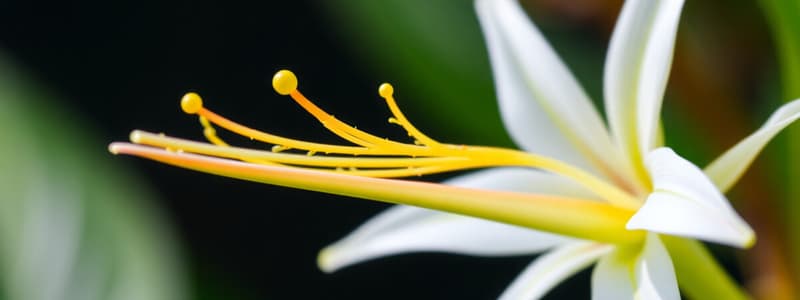Podcast
Questions and Answers
What discipline focuses on the study of animals?
What discipline focuses on the study of animals?
- Botany
- Microbiology
- Ecology
- Zoology (correct)
Which of the following describes the fundamental units of life?
Which of the following describes the fundamental units of life?
- Tissues
- Cells (correct)
- Organs
- Atoms
What term describes the ability of an organism to maintain a stable internal environment?
What term describes the ability of an organism to maintain a stable internal environment?
- Adaptation
- Metabolism
- Homeostasis (correct)
- Heredity
Which branch of biology studies microscopic organisms?
Which branch of biology studies microscopic organisms?
What concept involves the transfer of energy through food chains and food webs?
What concept involves the transfer of energy through food chains and food webs?
What is the process by which organisms adjust to their environment over time known as?
What is the process by which organisms adjust to their environment over time known as?
Which method is used to visually represent biological systems mathematically or through simulations?
Which method is used to visually represent biological systems mathematically or through simulations?
Which branch of biology deals with the study of genes and heredity?
Which branch of biology deals with the study of genes and heredity?
Flashcards
What is Biology?
What is Biology?
The scientific study of life and living organisms, exploring their structures, functions, growth, origin, evolution, and distribution.
What are cells?
What are cells?
The fundamental units of life, containing all the machinery for growth, reproduction, and energy production.
What is Evolution?
What is Evolution?
The process of change in the heritable characteristics of biological populations over successive generations.
What is Energy Flow?
What is Energy Flow?
Signup and view all the flashcards
What is botany?
What is botany?
Signup and view all the flashcards
What is zoology?
What is zoology?
Signup and view all the flashcards
What is microbiology?
What is microbiology?
Signup and view all the flashcards
What is ecology?
What is ecology?
Signup and view all the flashcards
Study Notes
Biological Sciences
- Biology is the scientific study of life and living organisms, encompassing various disciplines like botany, zoology, and microbiology.
- It explores the structure, function, growth, origin, evolution, and distribution of living things.
- Key concepts in biology include cells as the fundamental units of life, the flow of energy through ecosystems, and the diversity of life forms.
- Biological processes like metabolism, reproduction, and heredity are essential to understanding organisms.
- Modern biology integrates various scientific tools and methods, like molecular biology, genetics, and biotechnology, to advance our knowledge.
Branches of Biology
- Botany: The study of plants, including their structure, function, growth, reproduction, and evolution.
- Zoology: The study of animals, including their classification, behavior, physiology, and ecology.
- Microbiology: The study of microscopic organisms like bacteria, viruses, fungi, and protozoa.
- Ecology: The study of how organisms interact with each other and their environment.
- Genetics: The study of genes, heredity, and variation in living organisms.
- Physiology: The study of the functions and processes of living organisms and their parts.
- Molecular Biology: The study of biological molecules like DNA, RNA, and proteins, and their roles in biological processes.
Key Concepts in Biology
- Cells: The basic structural and functional units of life.
- Energy Flow: The transfer of energy through food chains and food webs in ecosystems.
- Evolution: The process of change in the heritable characteristics of biological populations over successive generations.
- Diversity of Life: The wide range of different organisms found on Earth, from single-celled bacteria to complex multicellular organisms.
- Homeostasis: The ability of an organism to maintain a stable internal environment, despite external changes.
- Adaptation: The process by which organisms adjust to their environment over time.
Methods in Biological Research
- Observation: Identifying and recording events or characteristics of organisms.
- Experimentation: Designing and conducting controlled experiments to test hypotheses.
- Modeling: Developing mathematical or computer-based models to represent biological systems.
- Data Analysis: Using statistical methods to interpret data collected from experiments and observations.
- Technology: Utilizing advanced technologies, such as microscopes, genetic sequencing machines, and imaging techniques, to investigate biological systems.
Levels of Biological Organization
- Atoms: The basic building blocks of matter.
- Molecules: Groups of atoms.
- Cells: The fundamental units of life.
- Tissues: Groups of similar cells.
- Organs: Groups of tissues that perform a specific function.
- Organ Systems: Groups of organs that work together.
- Organisms: Individual living beings.
- Populations: Groups of organisms of the same species.
- Communities: Groups of interacting populations.
- Ecosystems: Communities and their physical environment interacting.
- Biosphere: The global ecosystem encompassing all life on Earth.
Studying That Suits You
Use AI to generate personalized quizzes and flashcards to suit your learning preferences.




